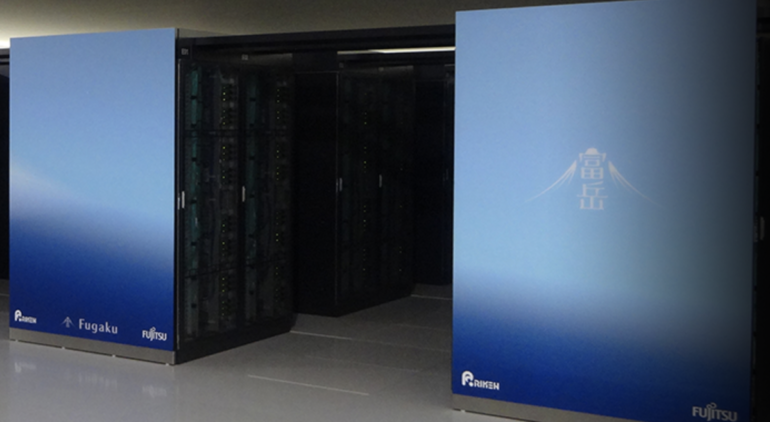Fugaku supercomputer, the most powerful computer in the world.
Image: Fujitsu
Fujitsu has announced it will use Fugaku, the Fujitsu and Riken-developed supercomputer, to identify small molecule inhibitory compounds that could be used as potential drugs for COVID-19 treatments.
The project, to be conducted alongside the Research Center for Advanced Science and Technology (RCAST) and the University of Tokyo, will leverage IT drug discovery technology to clarify the molecular mechanism that can inhibit COVID-19 infections, which the organisations hope will lead to the eventual development of small molecule therapeutic drugs for COVID-19.
Where Fugaku comes into play for this project is it will perform calculations to identify inhibitory compounds based on the dynamic behaviour of viral proteins and predict the properties of future mutations.
The supercomputer will also be used to perform molecular simulations for viral proteins to identify inhibitory compounds that can lead to therapeutic drugs at an early stage.
“As it is vital to create a molecular structure that can bind strongly to the viral protein and control its activity, molecular simulation technology and Fugaku will be widely used for tasks including the creation of three-dimensional structural models, clarifying the molecular mechanisms of infection inhibition, and predicting the properties of mutant strains,” Fujitsu explained.
The project started this week and will run until March next year.
Fugaku, touted as the world’s fastest supercomputer, was jointly developed by Fujtsu and Japanese scientific research institute Riken. While the delivery of Fugaku’s 432 racks was completed in May 2020, the supercomputer was only officially completed in March after seven years of development.
Since then, the supercomputer has already been put to use in identifying already existing drugs that are helpful for fight against COVID-19 in Japan.
The computer is now fully open for shared use, and Japan’s Research Organization for Information Science and Technology (RIST) has already selected 74 research projects that will be implemented.
Related Coverage
Fujitsu’s Fugaku supercomputer helping fight COVID-19 in Japan
Fujitsu is also hoping to make practical quantum computing a reality, launching three collaborative research projects with global institutions.
Fujitsu’s Fugaku supercomputer helps Tokyo university speed up cancer research
Tokyo Medical and Dental University was able to complete a cancer gene analysis within a day.
The world’s most powerful supercomputer is now up and running
Japan’s Fugaku supercomputer is likely to become researchers’ new favorite toy.
As AI pops up in more and more scientific computing, a new time test measures how fast a neural net can be trained
The tests reflect an increasing use of deep learning in scientific computing on the world’s biggest computers.



